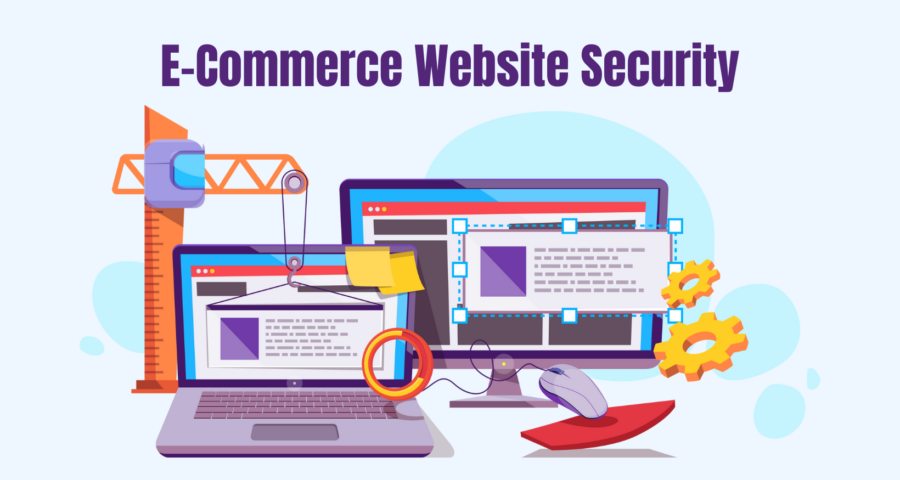In the age of digital commerce, where online shopping is the norm, the security of e-commerce websites is paramount. The vast amount of sensitive customer data circulating within these platforms makes them attractive targets for cybercriminals. To safeguard user information, build trust, and maintain a robust online presence, E-Commerce Website Security e-commerce businesses must adopt comprehensive web security practices. This article delves into the crucial best practices that can fortify the defense of e-commerce websites against a barrage of threats.
Understanding E-Commerce Website Vulnerabilities
Common Vulnerabilities
E-commerce websites face a multitude of security vulnerabilities that can leave them susceptible to cyberattacks. Among these vulnerabilities are data breaches, payment fraud, and phishing attacks. Hackers capitalize on these weaknesses to steal valuable customer data and compromise user accounts, causing substantial damage to both the affected customers and the business’s reputation.
Vulnerability Examples
Several high-profile security breaches have underscored the potentially devastating consequences of inadequate web security. These breaches often result in the exposure of sensitive customer data, enabling cybercriminals to engage in identity theft, unauthorized transactions, and other malicious activities. Such cases underscore the urgency of prioritizing and implementing robust security measures for e-commerce platforms.
Implementing Best Practices for E-Commerce Website Security
SSL/TLS Encryption
One of the foundational pillars of web security is the implementation of SSL/TLS encryption. This cryptographic protocol ensures that the data exchanged between users and the website remains confidential and tamper-proof. The presence of the padlock icon in the browser’s address bar and the “HTTPS” protocol in the URL signal a secure connection. This encryption is crucial for safeguarding sensitive information such as payment details and login credentials.
Regular Security Audits
Proactive security measures are paramount in the ever-evolving landscape of cyber threats. Regular security audits play a pivotal role in identifying vulnerabilities before malicious actors can exploit them. These comprehensive assessments involve examining the website’s code, databases, and servers to detect weaknesses. By addressing these vulnerabilities promptly, e-commerce businesses can bolster their defenses and minimize potential risks.
Strong Password Policies
Enforcing robust password policies is a cornerstone of effective web security. E-commerce websites should advocate for the use of strong, complex passwords for both customers and employees. Additionally, encourage periodic password updates to thwart potential attacks. For an added layer of security, implement multi-factor authentication (MFA) mechanisms that require users to provide multiple forms of verification before gaining access to their accounts.
Secure Payment Gateways
Collaborating with reputable and secure payment gateways is non-negotiable. These gateways handle the sensitive payment data of customers in a secure manner, ensuring that financial transactions remain intact and confidential. E-commerce businesses should refrain from storing payment information on their servers to minimize the risk of data breaches.
Regular Software Updates
Staying up-to-date with the latest software and plugin versions is a critical aspect of web security. Developers frequently release updates that include security patches and bug fixes. Failing to update your website’s software can leave it vulnerable to attacks that exploit known vulnerabilities. By promptly implementing these updates, you create a stronger line of defense against potential threats.
Data Protection and Privacy
With the rise of data protection regulations such as GDPR and CCPA, safeguarding user data is not only ethical but also legally mandatory. Implement data protection practices such as encryption, secure data storage, and transparent data usage policies. Prioritize user consent when collecting and processing personal information, and ensure that your website aligns with the requirements of relevant regulations.
Website Firewall and Intrusion Detection
Deploying a web application firewall (WAF) is essential for safeguarding your e-commerce platform. A WAF acts as a protective barrier, filtering incoming traffic and blocking potentially malicious requests. Additionally, implementing intrusion detection systems (IDS) allows you to monitor your website for any unusual activities, enabling you to detect and respond to potential threats promptly.
Educating Employees and Customers
Employee Training
Educating your employees about security threats and best practices is a critical component of maintaining a secure e-commerce environment. Train your staff to recognize common tactics used in phishing attempts and social engineering attacks. A well-informed team is instrumental in maintaining the security of your e-commerce platform.
Customer Awareness
Empowering your customers with knowledge is equally important. Educate them about secure online practices, such as verifying secure URLs and using strong, unique passwords. By fostering customer awareness, you enhance their confidence in your platform and encourage safer online behaviors.
Recovery and Incident Response
Incident Response Plan
Despite implementing robust security measures, no system is entirely immune to potential breaches. Developing a well-defined incident response plan is essential to minimize the impact of such incidents. This plan should outline the steps to be taken in the event of a security breach, assigning roles and responsibilities to ensure a swift and coordinated response.
Data Backup and Recovery
Regularly backing up your website’s data is a critical aspect of recovery and continuity planning. In the unfortunate event of a breach, having secure and up-to-date backups ensures that you can quickly restore your website to its previous state. Store backups in a secure, off-site location to prevent data loss in case of a server compromise.
Conclusion on E-Commerce Website Security
By adhering to these comprehensive web security best practices, e-commerce businesses can create a secure and trustworthy environment for customers. Prioritizing security not only safeguards sensitive information but also fosters customer loyalty and contributes to the long-term success of your online venture. Remember that maintaining robust security is an ongoing effort that requires vigilance, adaptation, and a commitment to staying ahead of evolving cyber threats.


Leave a Reply